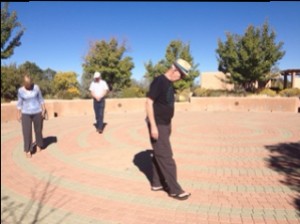 It’s a big city in which I live, in a big nation, in a big world, many, many people populate it. But so many encounters and images that come to me are with and of people who are lonely–old people and young, married and un-partnered, active and retired. I wonder if there is something essentially lonely about being a human being. Once we leave the protective nurture of the mother that bore us, we are in many ways on our own. However, conversations these past days in my life accentuate the loneliness. I listen to stories of children estranged, of bodies limited by illness, of untimely deaths, of ruptures in long-loved relationships, of being misinterpreted, of being the only one who is still faithful. The loneliness is painful. It feels hopeless and powerless, joyless and endless sometimes.
It’s a big city in which I live, in a big nation, in a big world, many, many people populate it. But so many encounters and images that come to me are with and of people who are lonely–old people and young, married and un-partnered, active and retired. I wonder if there is something essentially lonely about being a human being. Once we leave the protective nurture of the mother that bore us, we are in many ways on our own. However, conversations these past days in my life accentuate the loneliness. I listen to stories of children estranged, of bodies limited by illness, of untimely deaths, of ruptures in long-loved relationships, of being misinterpreted, of being the only one who is still faithful. The loneliness is painful. It feels hopeless and powerless, joyless and endless sometimes.
I think about all those in the Biblical story who felt alone: Elijah under the broom tree wanting to die, Paul in prison waiting for some companionable presence, Jesus in the Garden of Gesthemane, pleading for someone to watch with him. How do we bear the loneliness that creeps upon us, that invades us like a blanketing fog? And how can we be present and care for another’s deep loneliness?
I know first that I am called to notice loneliness around me. This story being told is more often about having someone to listen than it is the exchange of information. This sitting alone in the pew bespeaks a sense of not quite belonging. This absence from a familiar place could be more about feeing cut off, different or misunderstood, than a choice to do something else. So as a companion on the journey, I am called to pay attention–eyes, ears, heart– to those I have been given to love. Who is missing? Who longs for an ear to hear the story and have it reflected back to him? Who has suddenly gone mute after years of making important contributions to the ongoing conversation?
And I need to notice the lonely places in my self. My role in my family is morphing into one of the Elders; I have no generation of parents older than I am. My formal career has segued into one of episodic contributions, rather than full-throttle career, and along with the rest and relief comes the loss of a regular community of the faithful. My strong body requires much more attention than it used to–more vigilance is needed, more doctors to see, more judicious choices need to be made.
So how does the Holy One come to, speak to the loneliness we as humans have as part of our journey? The Psalmist laments (a good place to start): I am like an owl in the wilderness, like a little owl of the waste places. I lie awake; I am like a lonely bird on a housetop.” (Psalm 102: 6,7). Naming our loneliness in the Presence of the Holy One is a beginning to moving from the despair of loneliness to the safety of solitude. The Psalmist turns bereft attention to the action and nearness of the One who, according to St. Augustine, is closer to us than our very breath, the God of Many Names, and finds the beginning of solace there. How do I bring the attention of the lonely ones around me to that God? In a word of truth-telling about my own experience? In a word from sacred text? Or in being as Teresa of Avila pronounced that my hands, my feet, my eyes to carry God’s compassion to the side of the lonely?











